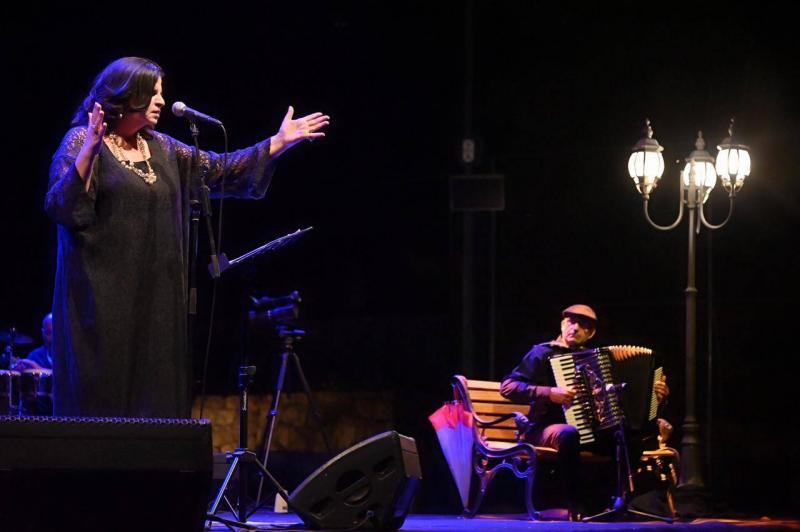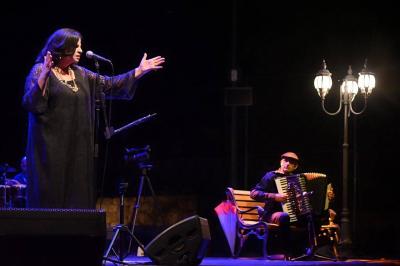When the voice transforms into an ethereal call, and the throat traverses the path of springs, when poetry crosses to the shore of light, and music ascends with the secret of beauty, it is undoubtedly Jaheda Wahbe. The "Poem of Song," dedicated to her heritage, has not deterred her from the temptations lurking in the modern era of music; rather, she has dug deep into the authentic earth, brushing off the dust of treasures that nearly touch rust. She is the blossom in a time of mediocrity, the guardian of authenticity against the hybrid strains of art, music, and singing.
What Jaheda Wahbe offers does not resemble any prevailing or contrived trend, and the temptations of such trends have not swayed her; she has continued to dig, and the earth is generous. What she presents is akin only to her refined approach, enriched with culture, thought, and a genuine and modern artistic vision, which has qualified her to remain, for decades, atop the artistic throne she has skillfully woven with her talent, culture, diversity, and uniqueness.
In "Douma," Wahbe knew how to encapsulate the musical moment in the ears and hearts. She is unique and experienced in creating suitable spaces for each event. An evening within the "Douma Festivals" was expanded by the diva to honor "divas" as if they were goddesses of legends. "Douma," the northern village crowned with terracotta and heritage, home to stars that never sleep, has history residing in a small melodic snippet resembling geography, where time and place melt into a swing called homeland, suspended between the sky of beauty and the earth of creativity.
There, in those timeless mountains, Jaheda crept into dewy evenings to create new paths for the birds, and a fifth season for nature, in this year’s summer festival, crowned by a voice we increasingly miss amid the quagmire of consumer art sweeping contemporary taste. An extraordinary evening presented by Wahbe, reminiscent of the dream Lebanon—culture, art, beauty, and purity. She conjured the icons of the golden age in a single enchanting night titled: "They in the Whirl of Melody: From Piaf to Umm Kulthum," accompanied by the musical band led by Maroun Yammin, opening the stage with a song written specifically for Douma by the melody and words of poet Majida Dagher.
In a musical context, she sang for Fairouz and the poem "Give Me the Flute and Sing" for Khalil Gibran, set to the melody of Najib Hankash. To the improvisation for which Wahbe is known, she presented poetry by Rabi’a al-Adawiyya with high proficiency and a sense of the mystical in the words. Wahbe did not limit herself to gathering these artistic musical figures in just one singing night (Fairouz, Edith Piaf, Asmahan, Dalida, Sabah, and Umm Kulthum) but also brought with her the necessary "accessories," transforming the stage into an inspiring spectacle from the era of those icons—melody, song, dance, performance, and music—all changing with each song, starting with the specific costumes suspended on a special frame used directly by the artist on stage, going through a seamless transition between musical and singing styles, which Wahbe masters with noted professionalism.
This reached the visual spectacles adorned with performances by artists who shared the stage with her, each in a different context, in stunning scenes accompanied by a dramatic performance of the songs, resembling a journey into the realms of the celebrated female singers and their unique worlds, in a unique artistic show prepared and presented by Wahbe.
From the Parisian scene with an accordion player on a bench under the street lamps in Paris, to the rhythm of Edith Piaf's songs performed by Wahbe in both Arabic and French, to the poem "Tell Me" by Souad Al-Sabah and its melody by Wahbe, moving on with Piaf again with a scene featuring magician Danny Dawood who accompanied her with delightful antics during her performance, to the delicate presence of the artist's sister, Jana Wahbe (who coordinated and managed the celebration) in a joint performance of a poem by Ahlam Mosteghanemi—an enjoyable and intriguing melodic journey.
Dance enjoyed a generous portion, with the duo Carol Haddad and Adnan Ni'ma to the rhythm of the song "Morning Star," with lyrics by poet Talal Haydar and melody by Wahbe, alongside traditional folkloric dance with the "Zeina Al-Layali" troupe, which accompanied her in the song "The Anklet of Time," with lyrics by poet Talal Haydar and her compositions, interwoven with a poem dedicated to Douma from the poetry of Germano Germano. To the dancer Eliana Satouf, the surprise of the evening, as she dangled from the side of the stage on a crane, dancing on what resembled a long red scarf that moved with Wahbe's voice.
In this diverse evening, akin to a field of flowers, the artist continued this variety by singing in multiple languages, in addition to French with Piaf, melodiously performing in Spanish "Gracias a la Vida" by Spanish singer Mercedes Sosa, or "Thank You for Life," adapted by Rachida Mohammadi and Aya Al-Diqah. Persian was not absent from this musical mosaic, as she sang from the poetry of Omar Khayyam the poem "Moonlight" in a rendition, in Persian and Arabic.
Except for the classical pieces Wahbe performed, all she sang from her own repertoire is of her composition, like her famous song that has become an icon of her works "Do Not Go to the Forest," with lyrics by German author Günter Grass, Nobel Prize laureate. The audience repeatedly brought the artist back to the festival stage, demanding she continue singing, especially when she performed the song "You Are My Age" for the Star of the East (lyrics by Ahmed Shafik Kamel and melody by Mohamed Abdel Wahab) and other songs, resembling an insatiable thirst for Wahbe’s performance and voice—reflecting the audience's longing for authentic art that Jaheda Wahbe embodies in all its manifestations.




